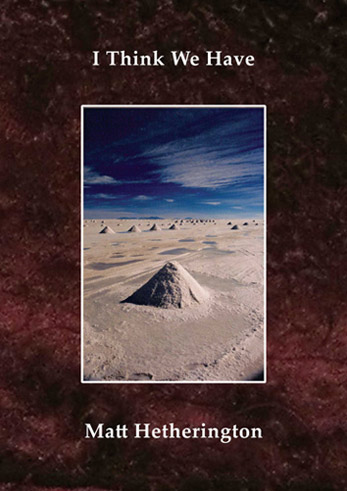 I Think We Have by Matt Hetherington
I Think We Have by Matt Hetherington
Small Change Press, 2007
I met Matt Hetherington briefly one year at the Queensland Poetry Festival, mingling in the post-reading foyer space; he impressed me as someone who was calm amidst the storm of poetry and red wine enthusiasts. He discussed his passion for haiku and I got a glimpse of the composed, almost meditative and reflective voice which infuses his poetry. This is not to say that I Think We Have is a collection destined for your next monastic hilltop retreat, but there is something here which slows the reader down, encourages circumspection and simple reappraisal of life's sensual pleasures.
I Think We Have is one of the first series of chapbooks to be released by new Brisbane publisher Small Change Press. Elegantly designed, the book's cover signals the mood of introspection – hundreds of salt pyramids stand isolate under a blue sky, footprints indicating the 'trace' of the human. From the outset of the collection, the readers are asked to consider and question their placement in this landscape, indeed in the world:
nowhere to be
nothing to thinkbut this
Hetherington's 'A Dozen Ways of Looking at the Sky' gestures towards Wallace Steven's poem 'Thirteen Ways of Looking at a Blackbird' in which Stevens suggests the blackbird as metaphor for the changeable and shifting quality of the self. Birds also inhabit Hetherington's poem, and here too they signal the unsettled nature of 'self' as starlings and black birds scatter darkly across the 'implacably quivering sky'. The poem balances light with dark as the poet moves from the innocence of childlike skyward contemplation – 'the sky is a cap/ that fits on my head' – to the impotence and impossibility of true self expression; and the small 'i' poet, becomes mute before the sky:
i could crack
that blue china bowl
if only i knew
the right word to scream
Ben Lee's title song from his album Awake is the new sleep came to mind as I progressed through this collection. As with Lee's song, Hetherington appears to suggest we 'wake up' as we return to stillness, to centre, to the self, after the wash of our 24/7 lives. He disturbs the reader in 'I Will', with the line 'I will not remember' delivered as a mantra to keep one's inability to survive memory and reality at bay. Although the poem keeps direct references oblique, it evokes the human misery experienced in detention centres or prisons, 'the corner of my room where i couldn't hide'. 'Fear poems' suggests a similar crisis, the self incapable of expression, 'suspended perpetually mid-sentence/ shivering alone in an unlit cave'.
I Think We Have is Hetherington's third collection of poetry; it follows a chapbook of haiku and senryu released in 2005. While there is no haiku to be found in this collection, the crafting of measured lines and the attention to self in the natural world is evident. As any good yoga instructor worth their Asana will tell, inner and outer harmony all depends on control of the breath. Hetherington structures these contemplative moments beautifully:
i have spent so much time n looking up & down
& i'm peering out still
mouth in the clouds, feet in the sea
'Nothing if not;
Love and sensuality are at home here. 'Six beginnings' journeys through the tumultuous experience of unexpected joy and grief at the arrival and subsequent loss of a child, and the reader is witness to grief. Here in the darkest hour Hetherington delivers his bittersweet optimism:
a child prancing through grass
holes lurking like spiders
a leaf lands on a rose
clouds like blood in water
the warmth has gone back north
six beginnings to spring
This poem segues nicely into the love poem 'Lip-service' and is followed later by 'Three Short Love Poems' where the poet connects experiences of sexuality and love – 'the cyclic mating call of the rhapsodist' – to possibilities of 'truthful vision'.
Ironically this 'truth' is perpetually thrown into question, for the reader is on a journey in this book. Poems titled 'We', 'I will', 'Of' , 'This', 'Think' stack up like building blocks until we journey with the poet and question: what in fact do we think we have? Concluding with the poem 'I Think Of What All This Is We Have' the reader is confronted with a word game which shifts the subject of the line with each stanza:
of this we have i think 'what is all?'
'this' is all of what we have i think.
Hetherington makes us aware that we are infinitely fragile. He explores concepts of possession, ownership, having it all and having nothing, and the exquisite difficulty of exchanging ideas as knowledge or faith. With the final poem in I Think We Have the reader circles back to ideas suggested by the epigraphs opening the collection by Yannis Ritsos and Bhagwan, deliberating on the notion of 'having', as ideas resonate and accumulate. I Think We Have is a delicious sampling of Matt Hetherington's reflective and meditative vision. I apologise in advance, but I can't resist the pun: it's a book I think you should have.
Kristin Hannaford is a Queensland poet and her new collection is Fragile Context.









